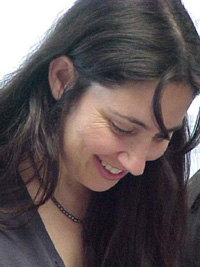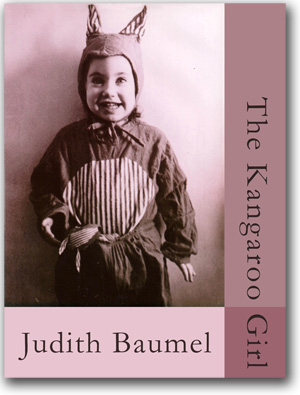The Kangaroo Girl
Judith Baumel
GenPop Books, 2011
ISBN: 9780982359433
Poetry, 6″x8″, 78 pages, trade paperback
Order from SPD
Starting with a photo that spent four decades in her father’s wallet (“Photo of Author In Kangaroo Pajamas”), Judith Baumel shows us new ways of understanding family and history. In this quintessentially modern book, her third, The Kangaroo Girl detects religion at the scene of many crimes: from the great disasters of the past—Edward I’s edict of expulsion in 1290, the War Between the States, the catastrophes of twentieth century Europe—to the small calamities of Jewish American life in the ethnic neighborhoods of New York City. The Kangaroo Girl is also a personal book, a meditation on being a daughter and a mother, and, in a series of moving elegies, what it means to survive loss. Judith Baumel’s love affairs with the visual—great buildings, great paintings, great art—and with the mysteries of language in great books and great conversations combine in this testament to human inventiveness and resilience.
[A] book of rare power and beauty…. a playful nostalgia and a haunting regret…. a meditation on worlds and people lost…. Baumel’s subtle art is to pair lightness with gravity, touching on matters of mortality, faith, and history with extraordinary fluency….—Poet’s Quarterly
Judith Baumel’s new poems are inspiring cabinets, loaded with gorgeous sounds, startling juxtapositions, and emotionally intricate quests. Sophisticated and subtle prosodic effects find their match in the poet’s intellectual alertness, her endearing inquisitiveness: her carefully modulated lines bend, hurry, linger, exult, and effloresce, with idiomatic inventiveness and grace. The Kangaroo Girl is an important achievement by a remarkable poet.
—Wayne Koestenbaum
I love Baumel’s poems, their restless bravura intelligence, their verbal pyrotechnics leavened with sorrow and the wisdom they’ve earned in sorrow. The Kangaroo Girl is interested in everything historical, from the medieval persecution of the Jews to the toys of technology, to the stories of our bodies. She charts the inexorable changes that choose us, and those we choose.
—Gail Mazur
Readers of Judith Baumel’s poems know to expect a perfectly-heard line, a self-deprecating charm and indulgent wit that can turn the smallest occasion into a matter of weight, a blend of strong intelligence and sheer friendliness. But throughout The Kangaroo Girl, and especially in its last third, they will also find the collision of a new silence and a new intensity. This is Baumel’s best work yet.
—James Richardson
Judith Baumel writes fierce and delicate meditations, combining an intimate personal lyricism with a broadly historical vision. This is a wondrously moving, rousing, and often very beautiful book.
—April Bernard
More Reviews and Articles
Jake Marmer at The Jewish Daily Forward: “Three Kangaroo Poems From Judith Baumel”
Motherhood and growing up in the Bronx are the two main threads running through Judith Baumel’s recent poetry collection “The Kangaroo Girl” (GenPop Books, 2011). Gaining force with each new poem, these themes grow into personal mythologies that lend themselves to mirth, nostalgia and philosophy.
The collection, of course, is not limited to these two subjects. In fact, the variety of ideas and forms filling the book makes it seem that Baumel is capable of doing anything, and of doing it with virtuosity and wit.
Adam Wisnieski at Riverdale Press: “Bronx ‘literary landscape’ excites her imagination”
“I started out … not hating the Bronx, but thinking the Bronx was a backwater … Once I started writing about it, it’s completely the center of what I write about,” she said on Monday afternoon at Noni’s, a small coffeeshop on Riverdale Avenue.
From the heights of Riverdale, some might consider the western view of the Hudson River and Palisades more poetic. But Ms. Baumel looks east. She looks out across Kingsbridge and Fordham, past the Throggs Nest and Whitestone bridges, all the way out to the Long Island Sound.
“I’m looking out and at the far end you’re seeing Gatsby … you go out and see a little of the Poe landscape … you can see actually a little of the Wallace Stevens landscape,” she said. “There’s a literary landscape, a kind of living literary landscape that I really, really love,” she said.
About Judith Baumel


